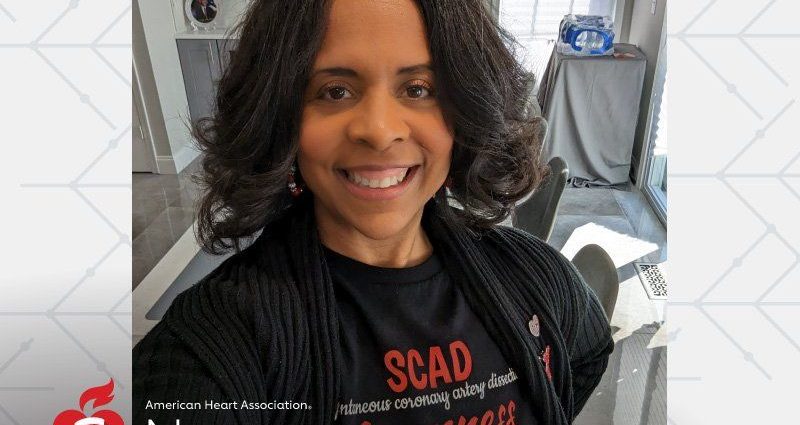TUESDAY, Aug. 8, 2023 (American Heart Association News) — Donnese Tyler’s schedule was chock-full. With a husband, two sons, a demanding job in contracts management and a reluctance to say no to anyone, she rarely made time for herself.
On an errand-filled Wednesday last October, she was looking forward to the monthly meeting of the mothers’ club at her son’s high school. As the group’s vice president, she helped run the meeting. She was also eager to socialize with her friends.
She ate salad with spaghetti sauce as dressing and had a glass of red wine while chatting with fellow moms. When the meeting started, Tyler opened a bottle of water and took a sip.
What brand of water is this, she wondered, with a disgusted look on her face. It tasted salty.
She cracked jokes about the water and asked a few people drinking the same brand if theirs tasted awful as well. They said no.
After the meeting, Tyler grabbed a diet soda for a little caffeine boost before the 40-minute drive home to Springdale, Maryland, just outside of Washington, D.C.
She took a few sips and put it down.
As she was talking to two women, Tyler grabbed her chest and gasped. Out of nowhere, she felt a sharp pain, as if a baseball had been launched into her sternum.
Maybe her meal, in combination with the caffeine, was causing acid reflux, she thought.
As she went to gather her things, she felt lightheaded. She sat down and rested her head in her hands.
“Are you OK?” one of the women asked.
Another woman touched her forehead.
“She’s burning up! Is there a doctor here?”
One of the mothers, Tosha Luchtefeld, is a nurse practitioner. She rushed over.
Tyler detailed what she’d eaten and mentioned the salty-tasting water.
The woman’s expression changed.
“You have to get to the hospital now,” she told Tyler.
“I think I just need to go home and rest,” Tyler said.
“No, you’re going to the ER,” Luchtefeld insisted. She’d remembered learning that taste can be affected by heart problems.
Tyler’s husband, Don, met her at the emergency room. By the time she’d arrived, she was already feeling better.
“All this fuss and it’s probably just acid reflux,” Donnese told Don.
Nurses drew blood and continued to check her vitals in the waiting area until a bed was available. By the time a doctor arrived, she felt back to normal.
“We wanted to let you know we’ve found the enzyme troponin in your blood,” he said. “That means some heart trauma has taken place.”
“What?” she said. “I can’t believe this.”
They told her they needed to transfer her by ambulance to a hospital with more advanced diagnostic equipment.
“We’re going to get over there, they’re going to test me and send me home,” she told Don.
Three days of testing finally resulted in an answer. A coronary angiogram revealed that Donnese had experienced a rare type of heart attack called a spontaneous coronary artery dissection, or SCAD. It isn’t like a traditional heart attack, where a clot blocks blood from reaching the heart muscle. Instead, blood flow is blocked because of a separation, or tear, in the lining of the artery wall.
SCAD patients typically don’t have heart disease risk factors. They’re also often in their 40s or 50s, healthy and active. Donnese was 51.
Doctors said the tear would heal itself in about a month and that she would be treated with medication. They said it was likely caused by hormones and stress. They advised her to minimize her stress.
On the fourth day, Donnese went home, filled with anxiety.
“I was afraid to sleep. I was afraid to walk anywhere,” she said. “I was afraid it could happen again.”
Donnese asked for a referral for cardiac rehabilitation so she could start to exercise in a controlled setting and learn her limitations. She also took a stress management course.
“I saw how much breathing and meditation helps,” she said. “I learned that I can’t be and do everything for everybody else anymore.”
She started using a meditation app to help relax.
“Every morning I find a guided meditation to start my day with,” she said. “Before, my alarm would go off and I’d jump up and start going. Now I take 30 minutes to an hour of ‘me’ time.”
Before, Don would come home from work and Donnese would still be working, sometimes for several hours.
“Now, when she’s off, she’s off,” he said.
Donnese also finds solace in sharing her story to raise awareness about SCAD. She recently spoke at the American Heart Association Lawyers Have Heart run and walk event. That’s after she jogged the 5K portion – with Luchtefeld, the nurse practitioner, by her side. More than a dozen friends and family joined them as part of “Team Tyler.”
After Donnese spoke, AHA organizers gave her an award for her advocacy work.
“It makes me proud to see her take on this initiative and help other people who might not have support,” Don said.
For Donnese, raising awareness also is a way of healing.
“Sharing my story and telling others is what’s helping me get through,” she said. “If I can save one person, that’s my driving force.”
American Heart Association News covers heart and brain health. Not all views expressed in this story reflect the official position of the American Heart Association. Copyright is owned or held by the American Heart Association, Inc., and all rights are reserved.
By Diane Daniel, American Heart Association News
Copyright © 2026 HealthDay. All rights reserved.

